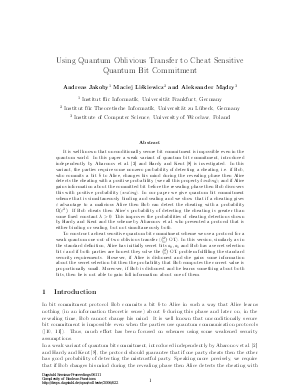Using Quantum Oblivious Transfer to Cheat Sensitive Quantum Bit Commitment
Authors Andreas Jakoby, Maciej Liskiewicz, Aleksander Madry
-
Part of:
Volume:
Dagstuhl Seminar Proceedings, Volume 6111
Part of: Series: Dagstuhl Seminar Proceedings (DagSemProc) - License:
 Creative Commons Attribution 4.0 International license
Creative Commons Attribution 4.0 International license
- Publication Date: 2006-11-30
File

PDF
DagSemProc.06111.21.pdf
- Filesize: 277 kB
- 12 pages
Document Identifiers
Subject Classification
Keywords
- Two-Party Computations
- Quantum Protocols
- Bit Commitment
- Oblivious Transfer.
Metrics
- Access Statistics
-
Total Accesses (updated on a weekly basis)
0Document
0Metadata
Abstract
We define $(varepsilon,delta)$-secure quantum computations
between two parties that can play dishonestly to maximise
advantage $delta$, however keeping small the probability
$varepsilon$ that the computation fails in evaluating correct value.
We present a simple quantum protocol for computing
one-out-of-two oblivious transfer that is
$(O(sqrt{varepsilon}),varepsilon)$-secure.
Using the protocol as a black box we construct a scheme for
cheat sensitive quantum bit commitment which guarantee that
a mistrustful party has a nonzero probability of detecting a
cheating.
Cite As Get BibTex
Andreas Jakoby, Maciej Liskiewicz, and Aleksander Madry. Using Quantum Oblivious Transfer to Cheat Sensitive Quantum Bit Commitment. In Complexity of Boolean Functions. Dagstuhl Seminar Proceedings, Volume 6111, pp. 1-12, Schloss Dagstuhl – Leibniz-Zentrum für Informatik (2006)
https://doi.org/10.4230/DagSemProc.06111.21
BibTex
@InProceedings{jakoby_et_al:DagSemProc.06111.21,
author = {Jakoby, Andreas and Liskiewicz, Maciej and Madry, Aleksander},
title = {{Using Quantum Oblivious Transfer to Cheat Sensitive Quantum Bit Commitment}},
booktitle = {Complexity of Boolean Functions},
pages = {1--12},
series = {Dagstuhl Seminar Proceedings (DagSemProc)},
ISSN = {1862-4405},
year = {2006},
volume = {6111},
editor = {Matthias Krause and Pavel Pudl\'{a}k and R\"{u}diger Reischuk and Dieter van Melkebeek},
publisher = {Schloss Dagstuhl -- Leibniz-Zentrum f{\"u}r Informatik},
address = {Dagstuhl, Germany},
URL = {https://drops.dagstuhl.de/entities/document/10.4230/DagSemProc.06111.21},
URN = {urn:nbn:de:0030-drops-6223},
doi = {10.4230/DagSemProc.06111.21},
annote = {Keywords: Two-Party Computations, Quantum Protocols, Bit Commitment, Oblivious Transfer.}
}
